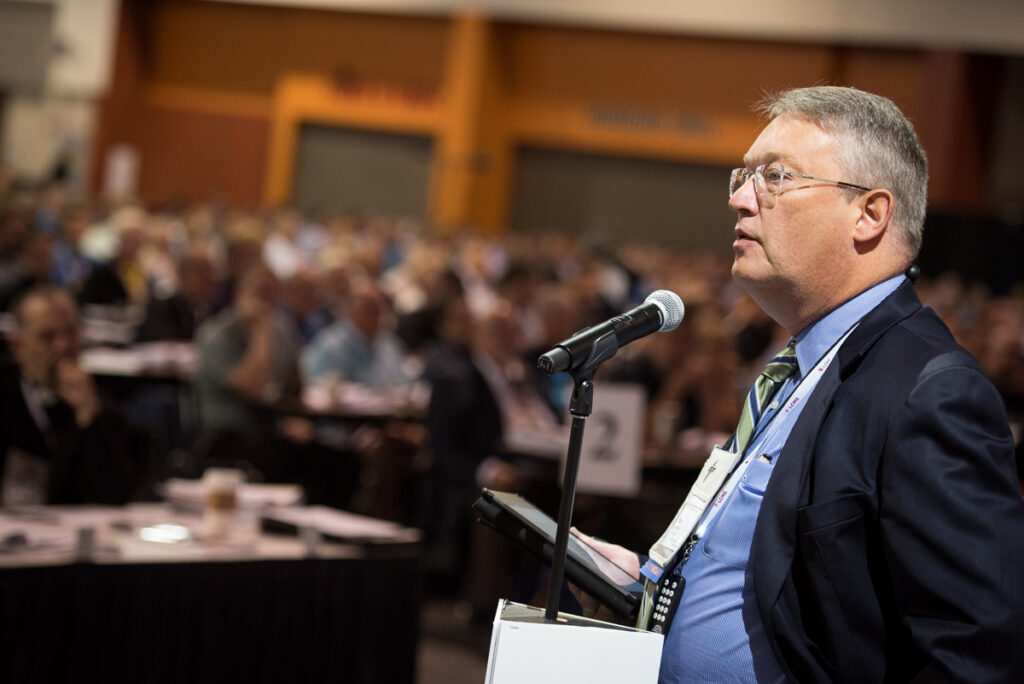
By Paula Schlueter Ross (paula.ross@lcms.org)
MILWAUKEE (July 13, 2016) — Delegates to the 66th Regular Convention of The Lutheran Church—Missouri Synod on Wednesday approved Resolution 12-14, a substitute for Resolution 12-01A that had faced lengthy debate when it was presented on Monday, July 11.
Before the vote on the new version of the resolution, “Regarding the Right of an Accuser to Appeal when a District President or the Synod President Fails to Act or Declines to Suspend,” LCMS President Rev. Dr. Matthew C. Harrison told the assembly he “fully” supports it, and the Rev. Kenneth Hennings, president of the LCMS Texas District and chairman of the Synod’s Council of Presidents (COP), said the COP “unanimously” supports it.
“God has blessed us with this resolution, which will allow the COP [which includes both the Praesidium and the district presidents] to address this important issue on behalf of the Synod,” Hennings said.
The substitute resolution — which concerns appeals in ecclesiastical-supervision cases that involve the possible expulsion of an LCMS member — gives district presidents the opportunity to offer “input as to proposed mechanisms to implement expulsion processes.”
Following the overwhelming adoption of Resolution 12-14 (by a vote of 996 to 67), Harrison invited LCMS Northwest District President Rev. Dr. Paul Linnemann to address the convention.
Linnemann said the work of Floor Committee 12 (on Ecclesiastical Supervision and Dispute Resolution) and, specifically, Resolution 12-01A, are “the result of a particular case that has drawn a lot of attention” in the Synod over the past few years and one in which he was “directly involved.”
Noting that Wednesday’s adopted resolution as well as several 2015 district-convention resolutions carry the phrase “when a district president fails to act,” Linnemann said “I need to share with this convention that this district president did not fail to act” and that the Synod’s “standard operating procedures were followed.”
Even though the case was discussed widely among Synod members, “no one” outside of the district’s staff and board of directors actually knew the facts about how Linnemann handled the case, he said.
Linnemann read from a letter he wrote three years ago about the case, which included: “Our challenge is to protect the church from misbehavior and false teaching and, when engaging a worker who is ‘under the microscope,’ to seek to preserve them and their place in the Synod. We are charged to care for the church and for the worker. … Unity that is pursued by eliminating dissenting voices comes at a high cost and is not the kind of unity our Lord prayed for in John 17. It has been my intent to pursue and preserve real unity throughout this whole situation.”
“The goal of ecclesiastical supervision” — “to win the sister or brother” — “has always been my goal … and it must be the goal of the church,” Linnemann said. Ecclesiastical supervision, he added, “is always a relational act that reaches out in care and in love,” and when expulsion is necessary, it must be carried out “with a broken heart and not with a triumphal spirit.”
He asked the assembly to pray for their district presidents, “that they may address these situations with genuineness, honesty, integrity and with a compassionate heart.” Convention attendees responded with a standing ovation.
Three other resolutions presented by Floor Committee 12 were adopted by overwhelming margins today:
- Resolution 12-02A (approved by 98.66 percent of delegates) encourages district presidents to provide pastoral care to church workers on “candidate status” (377 workers currently have such status, which means they are on the LCMS roster but do not have calls), also sharing their names in district publications and asking congregations and schools to consider them when calling candidates to fill open positions. The resolution also asks for the “possible development” of seminary programs to “help willing candidates be better prepared to re-enter active ministry.”
- Resolution 12-03 (96.59 percent) eliminates all references to “non-candidate status” in LCMS bylaws in order to clarify that all candidates (both “candidate” and “non-candidate”) are available for calls. The resolution also grants “immediate” candidate status to all current candidates and non-candidates for a period of 10 years, with possible renewal for five more years with approval from the candidate’s district president and 75 percent of the COP.
- Resolution 12-09 (97.4 percent) “updates and amends” the dispute-resolution process by making necessary changes to LCMS Bylaws 2.14, 2.17 and 1.10, which address appeal panels, the dispute-resolution process, the appointment and replacement of district reconcilers and hearing facilitators, the opportunity for district presidents to appeal hearing-panel decisions, expense responsibilities and the Synod’s Standard Operating Procedures Manual.
The floor committee’s final two resolutions were adopted by the convention later in the day:
- Resolution 12-05 (with a vote of 977 to 40) broadens the composition of hearing panels to include an additional lay reconciler and an ordained reconciler, expanding the panels from three members to five, because of the “extremely important matters that are decided by these panels (removals from membership in the Synod),” according to the resolution.
- Resolution 12-07A (adopted 684 to 244) clarifies, in LCMS Bylaw 1.8, the definition of dissent, bringing it “into alignment” with the recent CCM opinion 13-2665, according to Wille. Dissent from the doctrinal positions of the LCMS is to be discussed first — in private, rather than a public forum — with those who are “competent to evaluate the issue critically” and then brought to the attention of the Synod’s Commission on Theology and Church Relations. Any “public teaching” — including on blogs and Facebook pages — that is contrary to the established doctrinal position of the Synod “shall place in jeopardy membership in the Synod.”
Posted July 13, 2016
Learn more
Watch — Livestream and on-demand video
Read — Reporter Online | LCMS.org/convention
View — Photo galleries